- Home
- Shirley McKay
1588 A Calendar of Crime Page 5
1588 A Calendar of Crime Read online
Page 5
‘What book is that?’ It was plain that the secret had been hidden from the wife. And the candlemaker’s boy, called in from the yard, could throw no further light on it.
‘If I may?’ Johannes said. He came inside the shop, and began to clear the counter of its wares.
‘Whatever do you do, sirs?’ the candle-wife protested. Johannes did not falter, but turned the counter down, and opened up a panel in its outer edge. ‘It is hollow inside.’ He slipped in his hand, and pulled out a book.
‘Well, fancy that,’ said the candlemaker’s wife. ‘All that was his must now be mine.’
Hew had his hand on it. ‘I think you will find it belongs to the Crown. Unless you are prepared to pay the price for usury.’ He opened up the book. And though both wife and boy strained to see it too, their efforts were in vain, for they could not read.
The book was filled with names, and dates, that went back years. One name in particular, seeming to recur, came to Hew’s attention, for it last appeared on the same page as Johannes. ‘Who is David Doig?’
‘That man wis a thorn in my husband’s side. A thorn in his flesh, and a flesher,’ said the wife. ‘The fleshers are no more than renegats and thieves. The lot of them are rogues.’
The prentice boy explained. ‘The fleshers’ and the candlemakers’ work is closely linked. The law is, that the flesher cannot sell his tallow, but that he has it show it to the candlemaker first, and he must offer it to him, at the lowest price. That is a law that the fleshers try to cheat.’
‘Your master has written that David Doig was to bring him a bucket of fresh tallow on Candlemas Eve,’ Hew remarked aloud. And tallow was not all, he noted privately.
‘Aye, that wis right. There was a big row about it. My master had heard that Davy had some dead sheep – that is not common at the Candlemas – and he demanded fat from him, such as was his due.’
‘Yet it is not marked off.’
‘It widna be marked off. For when Davy brought it, it was full o trash. He had made the weight up, with a’ kinds of filth. My master telt him plain, to tak the stuff away, and he would rue it hard, if he did not bring fresh. And Davy swore at him, that he could go to hell for it.’
‘There was tallow in the shop, the morning that we found him,’ Hew pointed out. ‘Sitting in a pail, there by the board.’
‘Aye, sir, so there was, ye mind me of it now. He must have repented of it, and come back again, while I did my rounds. I took it to the yard, where it did belong.’ Eck screwed up his face. ‘I cannot tell you rightly when I saw it first.’
‘There was no pail,’ said Johannes, ‘when I came at nine o’clock.’
Hew asked, ‘Are you sure?’ He felt in his bones a shiver of excitement.
‘I am quite certain. He made me stand and watch him while he did his work. And I have, sir, as you know, a retentive sort of mind.’
‘God bless you, sweet Johannes,’ Hew said with a cry, astonishing the student with the present of a kiss.
Once Johannes was returned to the safety of the college, Hew made his way to the surgeon’s house, where he insisted he must speak to Sam. ‘It makes no matter if he will not speak to me. But I would be heard.’
The surgeon came at last, to hear what he supposed would be an indictment; no man looked more miserable who went to face his doom. Hew, in his excitement, had a strong desire to shake him.
‘I will put a case to you. You may find it fantastical, but listen, if you will.’
And as he told the surgeon what was in his mind, he saw the storm clouds lift, and his face transform. ‘Do you mean to say,’ Sam cried, ‘that I am not to blame?’
‘I warn you now,’ said Hew, ‘it will be hard to prove.’
‘It does not matter, if I know in my heart, that I am not to blame; I did not kill that man.’
‘Will you tell me now,’ Hew asked, ‘what hold he had on you? For you were not in debt to him. I did not find your name recorded in his book.’
The surgeon hesitated. ‘It was money, all the same. Well, I will tell you. It is a matter which gives me no pride. The business of embalming. It has lately been adopted by the candlemaker’s wife. She is very good at it. By tradition it is done by the wax-makers; that was their downfall in the plague. But in many places it is bread and butter to the barber-surgeon. I have felt the loss. You see, I have a wife, and a new-born bairn. I have – though Roger is an asset I do not deny – an expensive and demanding prentice boy, who must have new knives, and the sharpest saw. I do not grudge him that. But there is a balance to be made. And the candlemaker, acting out of greed, has taken from the pockets of the other trades – the fleshers and apothecars – with his pots of grease, his unguents, soaps and spice – and forces those in debt to buy their wares from him; the money that he makes is the money that he lends. He cares not where he deals. Did you ken that he was beadle once, in the parish kirk? He lost that place, for selling Catholics candles for the Mass.
‘So when he came to me, and begged me to let blood, I for once could bargain at the better end. At first, I refused. I telt him of the facts. But he implored and wept, his headaches were so bad he could not do his work, and nothing else, he telt me, could assuage the pain of it, but I would let his blood. He forswore the danger of it. And so I made a bargain with him. I would go to his house, and open the vein, and he would be sure to rest, and not exert himself. And in return, he would see that a half of the corpses he was offered for embalming would be sent my way. I did not take Roger, for I did not want the boy to be tainted with bad practice, but I can assure you, I took every care and skill with the phlebotomy. If he had rested on the second day he would have been well. And I swear to God, I did not mean to cut so deep.’
‘I don’t believe you did.’ It was, considered Hew, a grim little tale, and one that did small credit to the surgeon. ‘Why do you suppose he went against your word? Why was he convinced phlebotomy would help him?’ For, as any fool who had an almanack must know, it was no time of year to be letting blood.
‘He said it was phlebotomy had cured his pain before. But it was more than that. He had once consulted with a very fine physician, and had paid that man to draw his horoscope. He was told that he had a superfluity of blood, and a sanguine disposition, that had to be assuaged. He had a full repletion, and a red choking surplus, bulging at each vein. So much he had had from the great man’s mouth. What would a barber-surgeon know? But I swear to you, I never did imagine it would bleed him to his death.’
Hew had one last visit to make, before he put the case to Giles. On this occasion, he allowed Roger to accompany him, though he warned him he must wait outside. Roger objected to this. ‘I know that man. I bought blood from him. And a lamb’s bladder once.’
‘Aye, you are two of a kind. Stand out of earshot, but where you can see.’
‘Why should I not hear? It was I provoked you to investigation.’
‘You provoked me, certainly. He will not speak as freely, if he thinks you hear. Conversely, he is less likely to stick his knife into me, if he thinks you will see it. Comfort yourself. If he does, you will have the pleasure of observing it.’
‘What comfort is that, if I do not have the pleasure of hearing you squeal?’
The flesher was outside his shop, butchering a pig. Roger wandered off a yard or so, where the gutter had been stopped to stem the flow of blood. He squatted like a child before a rock pool full of crabs, and began to poke about in the debris with a stick. The flesher scowled at Hew. ‘Is that your boy?’ he asked. ‘Uncouth kind, he is. Likes to cut things up.’
‘He is not my boy, mercifully,’ Hew retorted pleasantly. ‘He is prentice to a surgeon, where his love for cutting stands him in good stead. Sadly, the surgeon is suspected of killing a candlemaker, and Roger is therefore at a loose end. That is not a place where it is good for him to be.’
‘Is that so,’ the flesher said, returning to his pig.
‘It seems late in the year, for the slaughter of a pig. It wi
ll soon be Lent,’ Hew observed.
‘It is a private pig, that met a sudden end.’
‘I am sorry to hear it. I hope it did not belong to the miller’s boy.’
‘What?’
‘The miller’s boy keeps pigs. I hope it is not one of his. Some people disdain to eat pork. I am not one of them.’
‘I ken no miller’s boy. The pig is not for sale.’
‘A pity, then.’ Hew stood in silence a moment, to watch the butcher slide his knife into the carcase at his side. He removed from the wam a large slab of fat, and slapped it on a board.
‘Is that tallow for candles?’ Hew asked.
‘You do not get tallow from pigs. That is lard.’
‘What is the difference, then?’
‘Lard is soft.’ The flesher muttered, ‘Not unlike yerself.’
‘Then what kind of flesh has the best fat for candles?’
‘Sheep fat is best. Cow, at a pinch. Why do you ask about candles?’
‘But it must be hard to find that at this time of year. No flock will be slaughtered, when it’s near to Lent. There would not be time for the flesh to hang.’
The flesher straightened up again. ‘Are you asking me, to sell you meat in Lent?’
‘I suppose I might be. But I had always thought that very hard to get.’
‘Then you have never looked for it in the proper places. Whatever you may hear, there is always flesh in Lent, though the markets may be closed for it. You only have to ask.’
‘Well, bless me,’ Hew exclaimed, ‘but I did not know that.’
‘It seems to me – your pardon, sir – that you do not ken much.’
‘I fear you may be right. I lead a sheltered life. I am a scholar at the university.’
‘Then that explains it, sir. The scholars at the college never get much meat, for fear it heats their blood.’
‘One thing that I ken,’ Hew said unexpectedly, ‘is that animals were butchered on the eve of Candlemas, for you took a pail of tallow to the candlemaker’s shop. Was it cow, or sheep?’
‘How would you know that?’ The flesher turned, suspiciously.
‘Because you left it there. And you mark your pails, as the farmer marks his sheep, to distinguish you from any other fleshers in the town. You need not answer, though. I know that it was sheep.’ So much Hew had learned from the candlemaker’s boy.
‘So what if I did? What devil are you, then, to come and question me?’
Roger looked back, at the sound of the flesher’s raised voice. There were other people in the street, though most had kept their distance from the flesher’s courtyard, which was far from clean.
Hew answered very softly, ‘Was John Blair asleep, when you brought the pail?’
The butcher hesitated. The fact he paused to think suggested what he said would most likely be a lie. But he could not decide. Finally he said, ‘He was dipping candles. He was not asleep.’
‘Yet it was very late.’
‘He required the tallow to complete his work. I brought him what I had.’
‘You brought him what you had earlier in the day. But he had refused it. He said it was foul.’
‘That is true. I wanted to oblige him. But I had no better in the shop. I had to find more sheep.’ The flesher answered easily. He had fallen for the trap, and did not wonder why; it was a relief to tell the simple truth.
‘That was a great length to go to. It must have been quite inconvenient,’ Hew said sympathetically.
‘That is what we do. There is no separate deacon of the candlemakers’ gild, so they look to ours, for help and benefit. The fleshers have always worked closely with them. Our interests are tied. They use our mort cloth, when one of them dies.’
The mort cloth covered coffins on their way to burial. ‘Apt, don’t you think?’ Hew remarked. ‘You shared other interests too. Did you ken he kept a book, in which he wrote your debts? Your interest was substantial. In that book he kept, he wrote down everything. He wrote down what was owed and he wrote down what was paid. And, as I suppose, he gave out a receipt. On the day he died, he had written that you owed a pail of tallow, and the sum of seven pounds. Neither was crossed off. I wonder why that was.’
‘He mentioned no receipt. But he was very tired. No doubt he fell asleep,’ the flesher answered stubbornly, ‘before he had got round to it.’
‘That is it, perhaps. But shall I tell what I rather think? I think you came with your tallow, and you found him fast asleep. Did you have the money, also, in your purse? Or did you have a tale that you had spent it on the sheep? In either case, you saw a short reprieve. You put the tallow down, and turned to go. You did not leave the money, for we found none in the house. But then, you looked at him. And he was really very sound asleep. The force of his exertions, his want of proper rest, the letting of his blood, that left him worn and weak, conspired to reassure you he would not awake. He had opened out the binding and offered up the vein, as though it were a gift. How could you refuse? How simple it would be to take the sharpest blade you carried in your belt and open up the wound; what surgeon’s art more supple than the butcher’s knife.’
‘This is slander, sir, and I will not hear it! If I killed him, if, why would I leave behind the bucket with my mark on it? Ha? Ha! Answer me that!’ It was plain that the flesher had rehearsed this many times; it was almost a relief to him to play the part at last.
‘You ask a pertinent question, sir, and that you ask it quickly undermines your words. I expect you have asked it over and again, ever since you saw that it was a mistake. To your credit, I suppose the killing was an impulse, one you did not have in mind when you first set out. A novice, after all, cannot think of everything.’
The flesher said boldly, ‘That is a lie, and cannot be proved.’
‘I grant it will be hard. But there is in our college a fine anatomist, who is especially skilled in identifying wounds. He has a kind of glass, that will tell him at a glance, if the flesh was torn by a single blade or two. And if there is a smear of sheep fat in a vein, or the smallest scrap of wool, he is sure to find it out.’
‘You are the devil!’ The flesher lunged at Hew, and Hew knocked the boning knife deftly from his hand. As it clattered to the ground, Roger wandered up, a pig snout in his hand. ‘How much is this?’ he inquired.
‘A glass, in which a man can see the matter in a wound? Whoever would believe in such a thing?’ demanded Giles.
They were sitting in the safety of the turret tower, where Hew had spilled his tale. ‘There are people who believe a corpse can name its killer,’ he replied.
‘As often, in a certain sense, it can. Your logic is fantastical. How I wish I had that kind of glass.’
‘It matters not,’ said Hew, ‘since he did not confess. The case cannot be proved.’
‘But doubtless, if the flesher is indicted for the crime, you will be a witness, and must serve upon the jury,’ Giles pointed out.
‘I suppose I must. Yet what justice can there be, when the jury is selected from such men as ken the evidence, and the panel too. It has always struck me as skewed,’ objected Hew.
‘None the less, if I accuse the flesher in my own report, and the sheriff is disposed to issue an indictment, you are the witness central to the case. You will not find it hard to convince the rest. As juror, you will have more sway upon them than the king’s own advocate. A magic glass, indeed.’
Hew was silent for a moment, for he had not thought of that.
‘If the man has sense,’ said Giles, ‘he will not wait around to hear you stand against him, but even as we speak will be packing up his bags. Whatever is the outcome, it is not a happy one.’
‘Yet for Sam,’ insisted Hew, ‘there is justice of a sort. He is rid of the horror that he caused John Blair’s death. And relief has made of him a different sort of man.’
‘It does not help me much in writing my report. For the truth is, Sam did practise phlebotomy, when his inclination and the season spoke against
it, and his judgement was impaired by interests of his own. Though I do not indict him on a murder charge, can I recommend to the deacon of his gild that such a barber-surgeon should not be struck off?’
‘I understand your qualms. Yet I believe you should. For Sam, in this case, did everything he could to ensure that Blair was safe. He warned him of the danger, and took every care, to keep him in good health. His instruments were clean, and he told him to rest. If John Blair had followed his surgeon’s sound advice, he would still be well. But he was adamant, quite adamant, that he must be bled. And we must wonder why.’
‘I do wonder it,’ said Giles. ‘It is not common practice in a patient.’
‘In the first place, he did not take heed of his surgeon’s words as keenly as he should. He believed, wrongly, that Sam Sturrock was refusing him the treatment he required because he had encroached upon the surgeon’s trade; therefore, he was well disposed to disregard his sound advice. And, in the second place, he had it on the highest, most impeccable authority that bleeding was the proper course in his state of health. He had it from the mouth of the finest of physicians. Whose opinion, for sure, he valued over Sam’s.’
‘What physician?’ murmured Giles. ‘I understood that none was called.’
‘Nor was there, at the time. But the candlemaker Blair had paid to have a horoscope, that telt to him the details of his disposition. And what was written there he followed to his end.’
‘A horoscope?’ Giles groaned. ‘Dear God, the beadle Blair! I drew up his horoscope! But that was years ago. He came to see me when I first came to the town.’
‘And did you tell him that he should be bled?’
‘I may have done. As I seem to recall, he had the most unbalanced disposition, I have ever come across. There was undoubtedly a superfluity of blood. But Hew, I did not mean to say, whatever was the time, for any kind of ill, I should prescribe phlebotomy, as an essential cure.’
‘Whatever else you meant, he took you at your word. And never had forgotten it.’
‘Dear God. Then I am to blame, quite as much as Sam.’

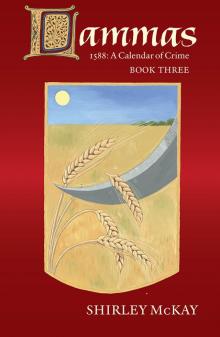 Lammas
Lammas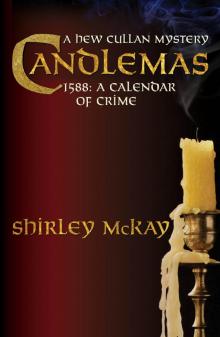 Candlemas
Candlemas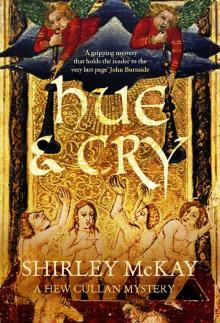 Hue and Cry
Hue and Cry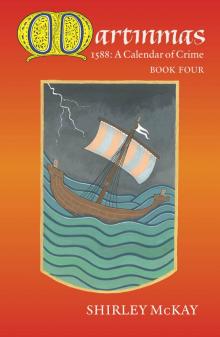 Martinmas
Martinmas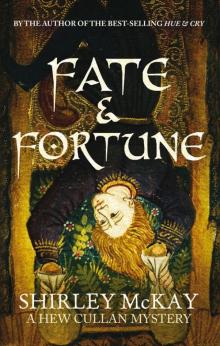 Fate and Fortune
Fate and Fortune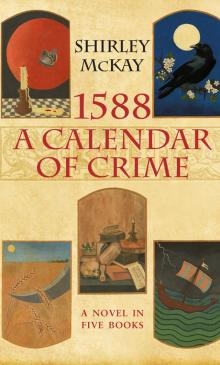 1588 A Calendar of Crime
1588 A Calendar of Crime Time and Tide
Time and Tide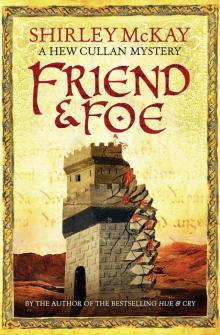 Friend & Foe
Friend & Foe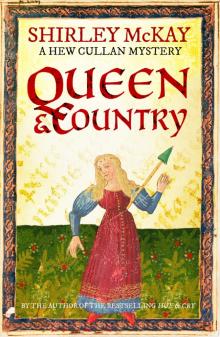 Queen & Country
Queen & Country